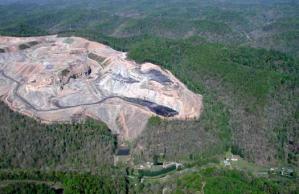 The Environmental Protection Agency yesterday issued its first-ever retroactive denial of a mining permit, rejecting plans for the largest-ever mountaintop-removal coal mine in Appalachia. The agency vetoed the crucial Clean Water Act permit for the Spruce Mine in Logan County, W.V., which had earlier been approved by the U.S. Army Corps of Engineers.
The Environmental Protection Agency yesterday issued its first-ever retroactive denial of a mining permit, rejecting plans for the largest-ever mountaintop-removal coal mine in Appalachia. The agency vetoed the crucial Clean Water Act permit for the Spruce Mine in Logan County, W.V., which had earlier been approved by the U.S. Army Corps of Engineers.
The EPA had warned the company to revise its plan to be more protective of water quality and affected ecosystems. It reviewed more than 50,000 public comments on the proposed mine before issuing the denial.
Environmentalists applauded the EPA for “following the law” governing pollution, and “following the science,” which documents the negative effects of surface coal mining — the burying of streams by blasted debris and high levels of toxic metal runoff into adjacent valleys effecting fish, amphibians and community watersheds. The controversial coal mine would have destroyed 2,300 acres of forest and buried nearly seven miles of streams.
“Forty years of surface mining has devastated the health of people of Appalachia and the environment,” said Tierra Curry, Appalachia native and a biologist at the Center for Biological Diversity. “Mountaintop-removal coal mining must end, and today the agency took a historic step in the right direction.”
Pollution from mountaintop-removal mining has been found to cause deformities and reproductive failure in downstream wildlife and has been associated with cancer clusters in communities exposed to high levels of metals and mineral in water.
Residents have been fighting the Spruce Mine proposal since 1998. The permit effectively ends current plans for the mine, but the company Arch Coal promises to challenge the decision in court, where the process has been entangled for 12 years.
In some counties in Kentucky and West Virginia, nearly a quarter of the total land area has been permitted for surface coal mining, which has destroyed more than 500 mountaintops, 1 million acres of hardwood forest, and 2,000 miles of streams.




















We’re starting to get it people! (took us long enough) But this is another huge step in the right direction.